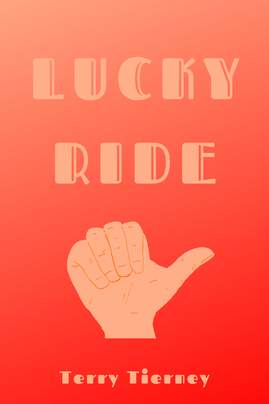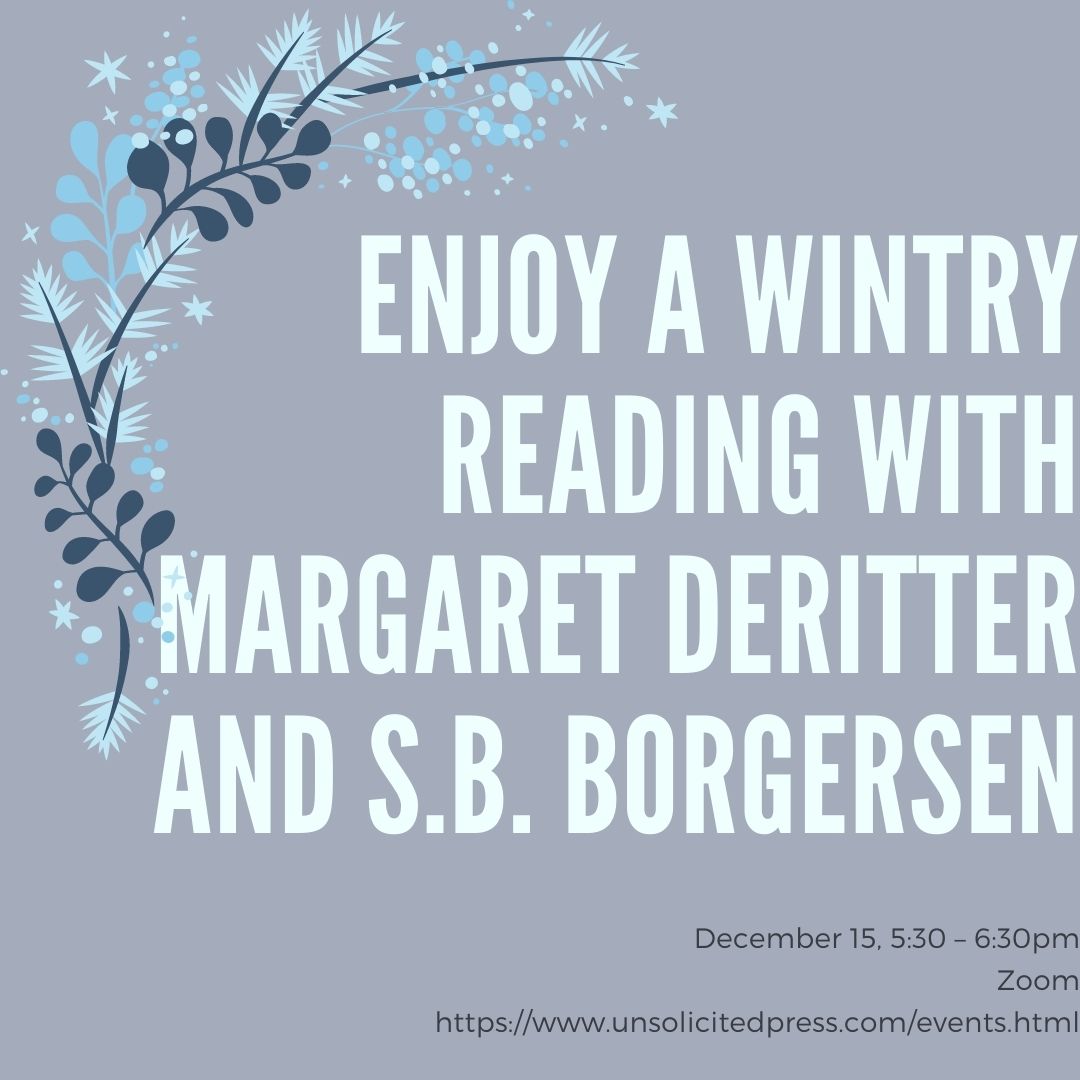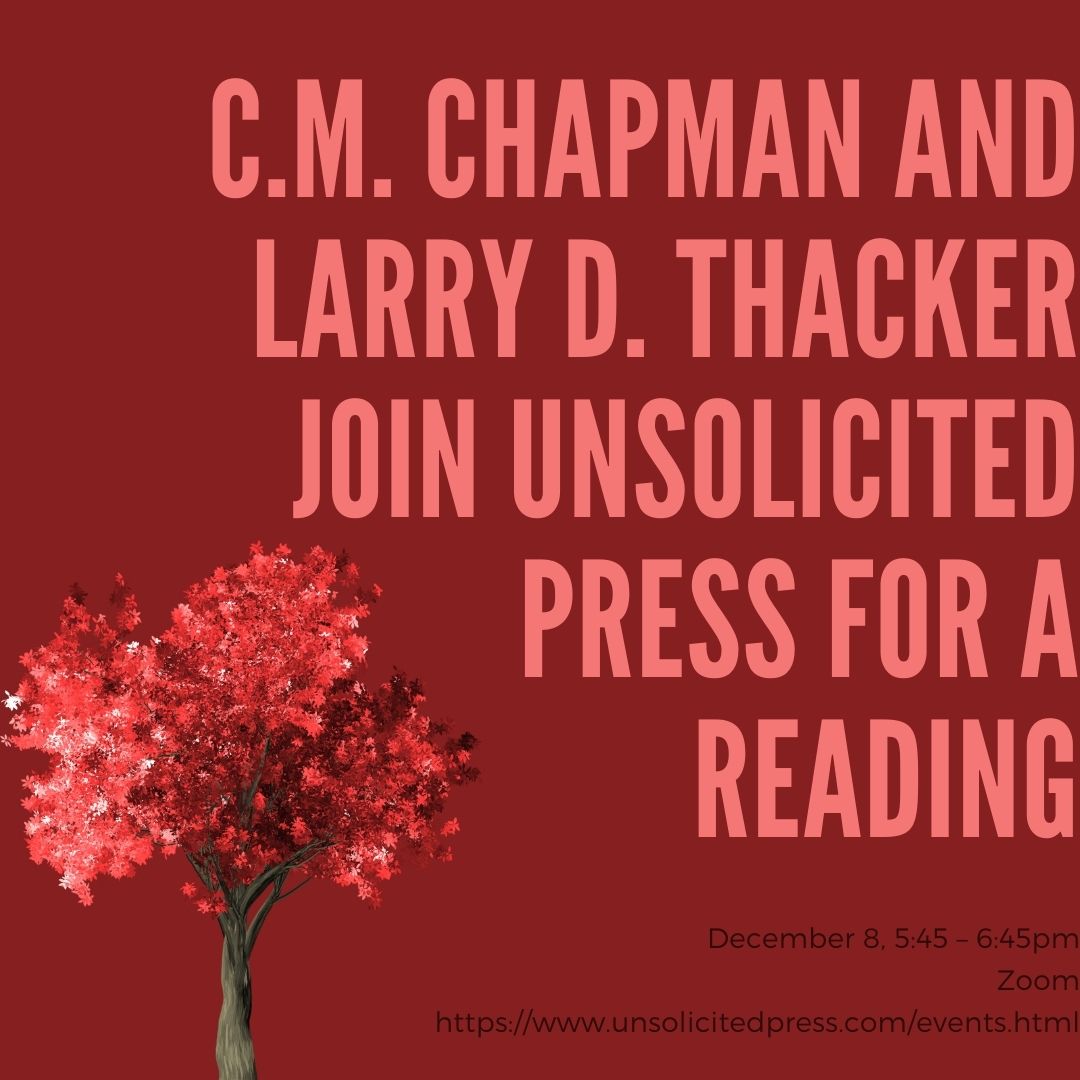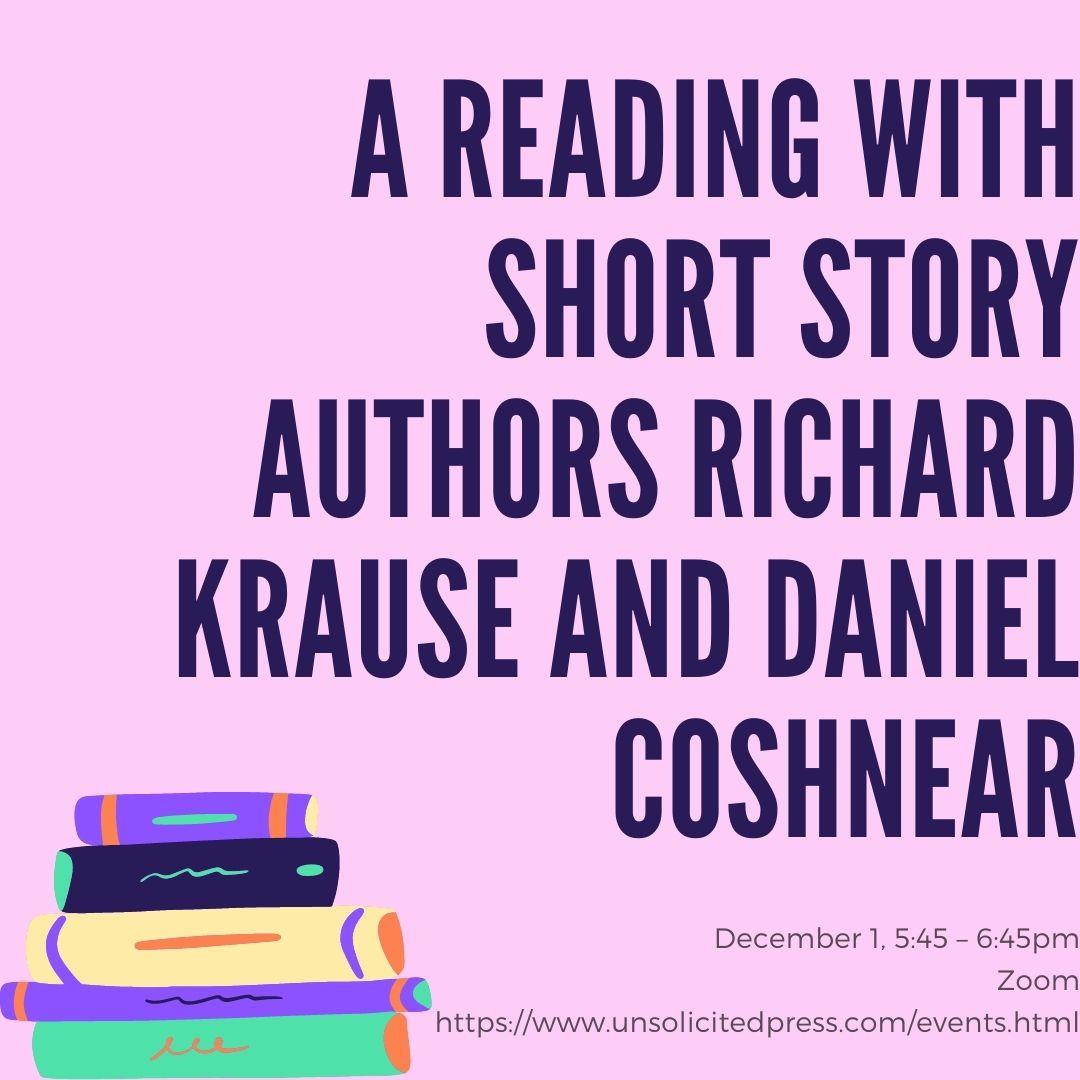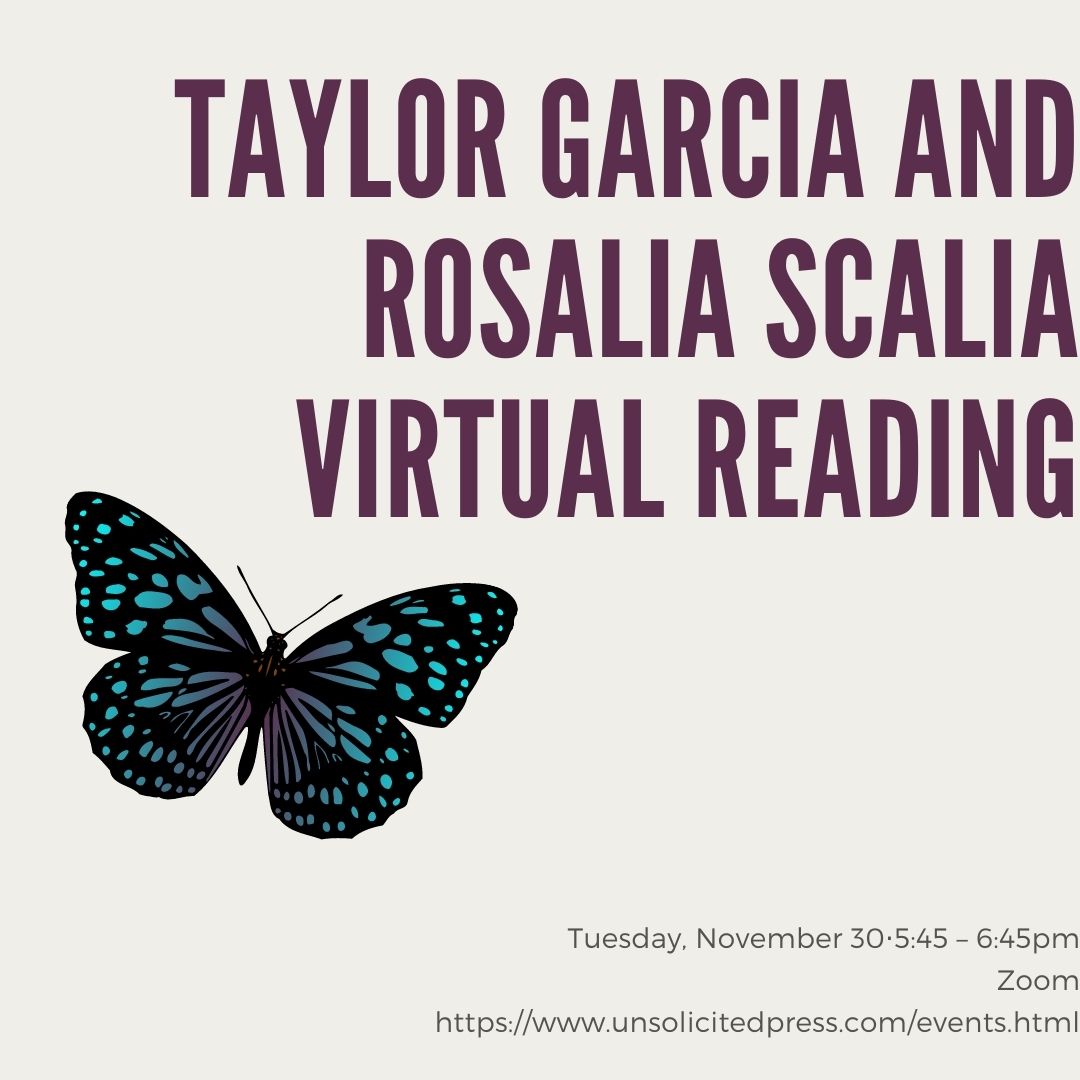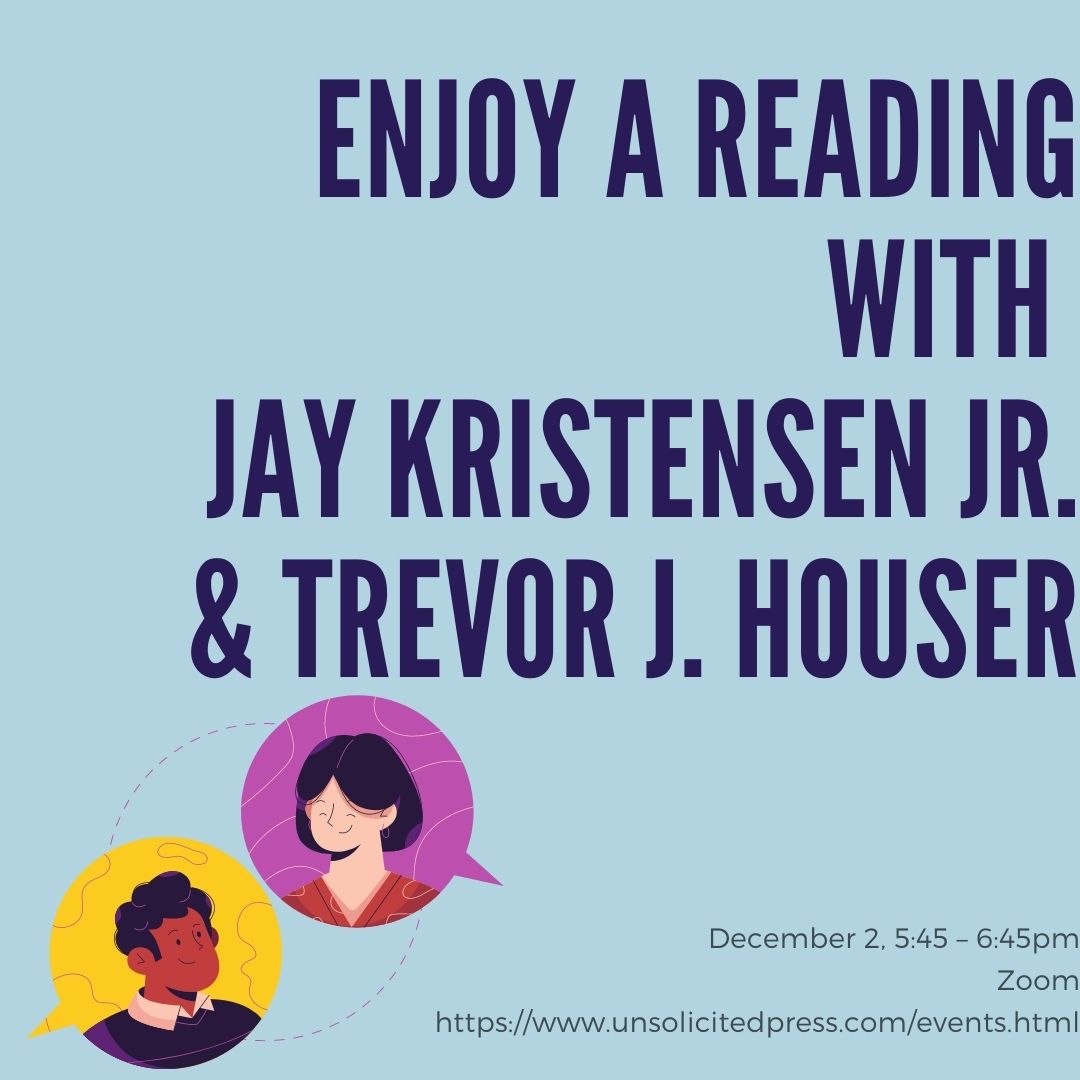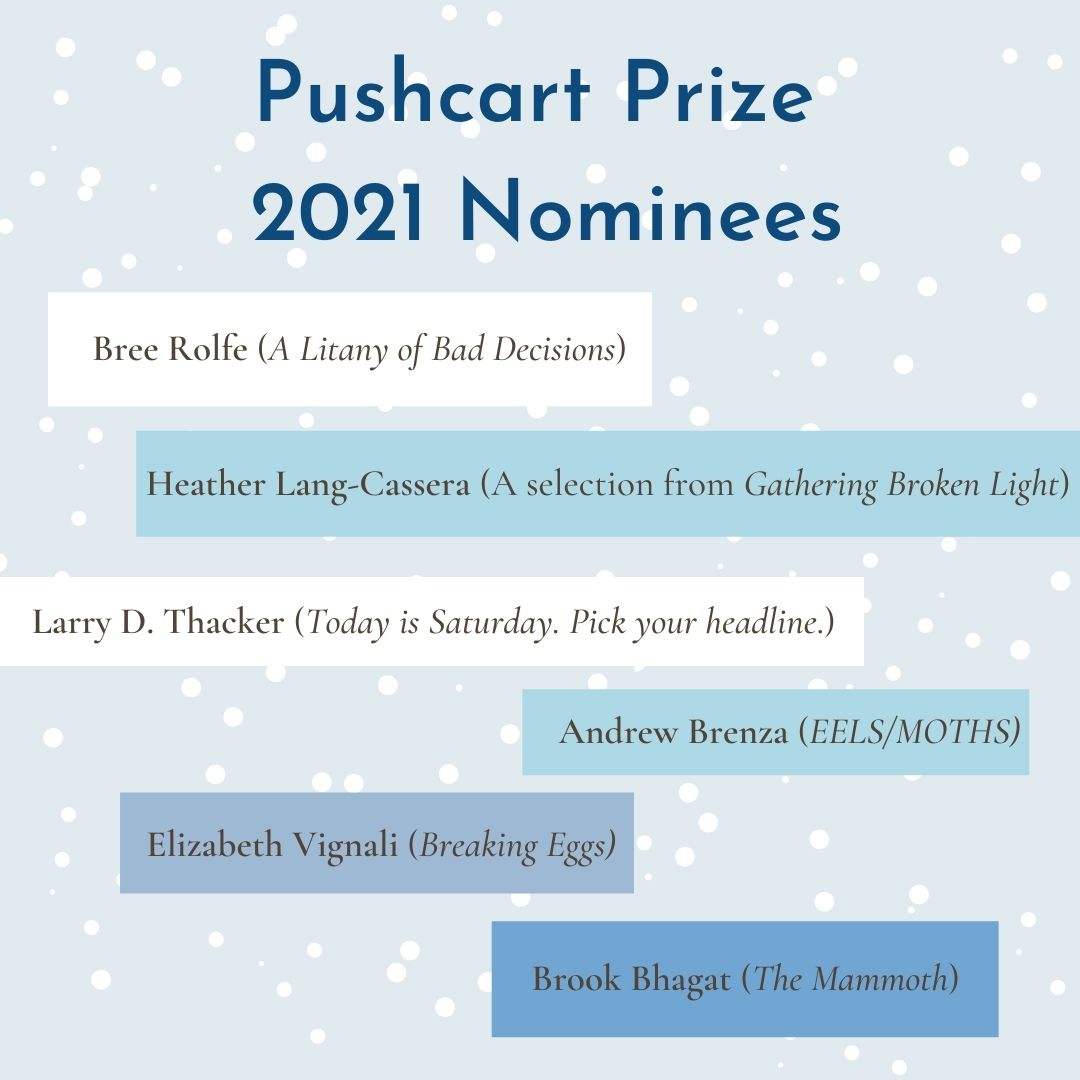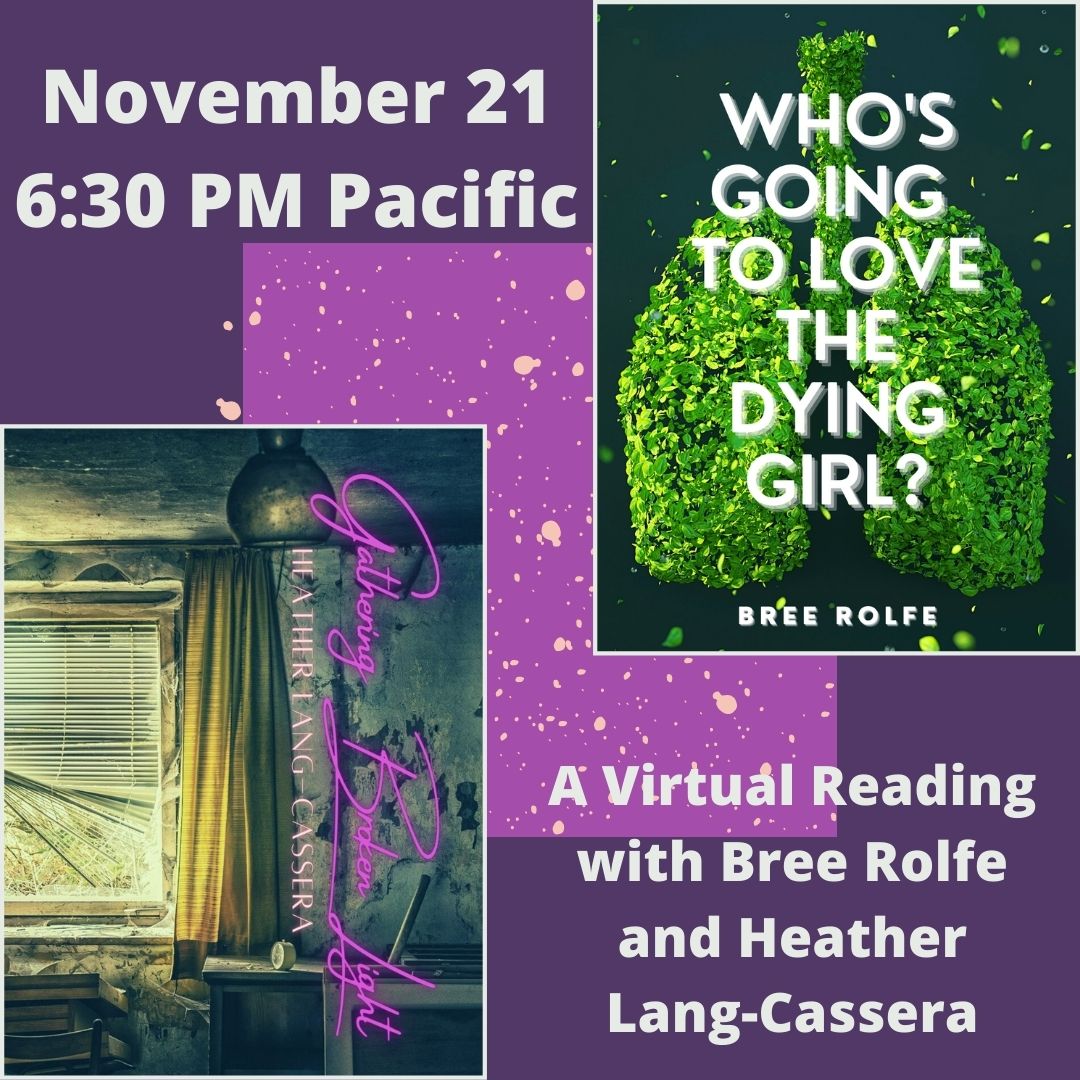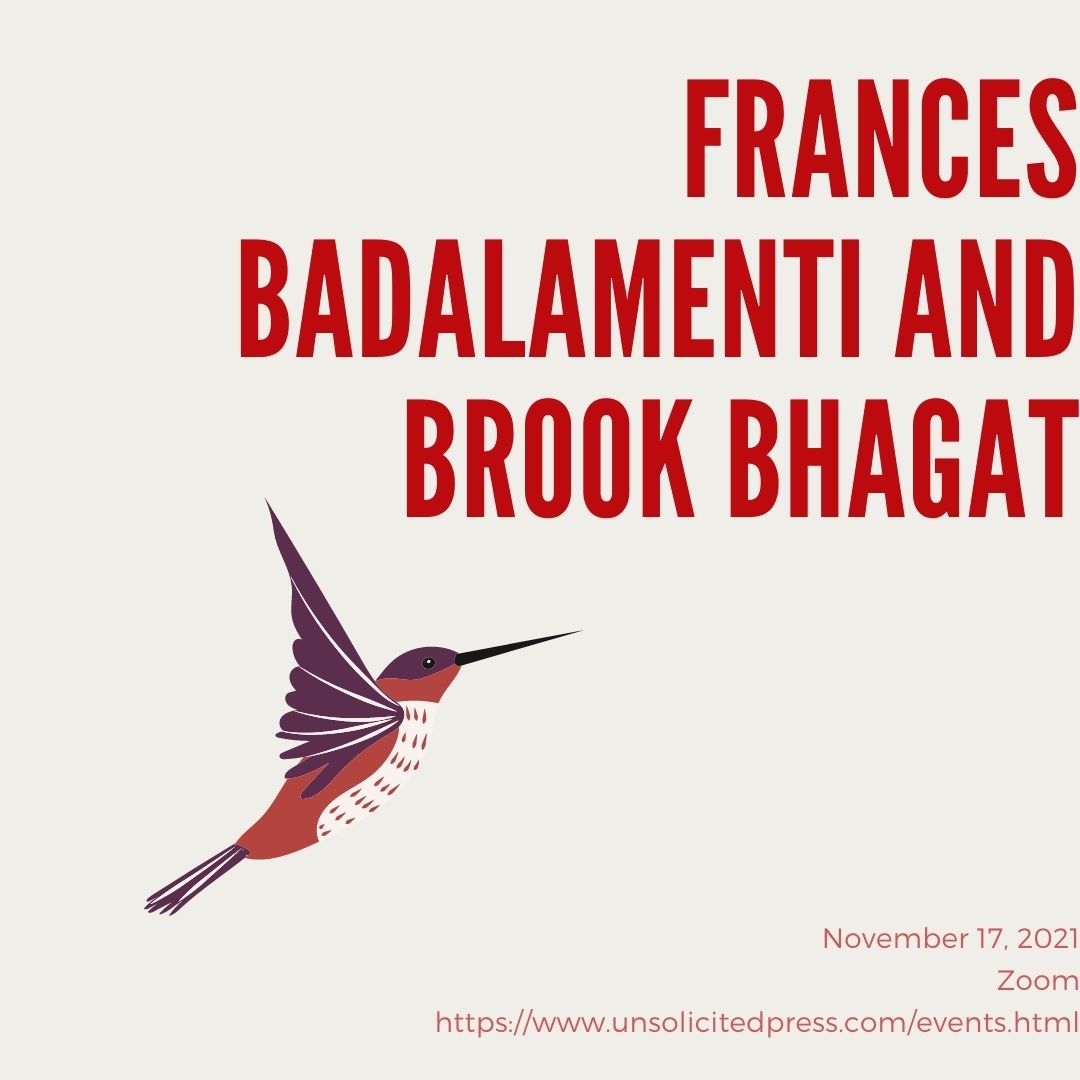Unsolicited Press
|
Our team spent the past summer choosing beyond-fantastic manuscripts. After reviewing thousands of submissions, contracts were offered to authors who exhibited strong, diverse, and fearless voices. These decisions weren't made without a few sacrifices and tears along the way...the pandemic has forced us to take on less -- but we are looking at that as an opportunity to work harder and smarter for the authors we are lucky to collaborate alongside.
Unsolicited Press is delighted to announce the acquisitions of: To Daughter a Devil by Megan Mary Moore (poetry) Ventric(L)e by Jerrod E. Bohn (poetry) A Dream of Train and Other Stories by Ron Singer (fiction) The First Hour in Exile by Jamshaid Wasson (poetry) Queen Anne Cowboy by Jay Kristensen Jr. (creative nonfiction) Hold Your Breath by Rana Bitar (poetry) Motel Stories by William Torphy (fiction) if the sky won’t have me by Anne Leigh Parrish (poetry) Night Hag by Amy Baskin (poetry) The Sequence Dance by S.B. Borgersen (fiction) Release Me by Tim DeMarco (fiction) Window Eyes by Philip Jason (fiction) A Sweetness Appears by Mick Bennett (fiction) What Will Outlast Me? by Sarah Lenz (creative nonfiction) Existentialism at the Wheel by Adam Gibbs (poetry) As Far As You Go by Alle Hall (fiction) The Bridge on Beer River by Terry Tierney (fiction) The Present is Past by Josh Rank (fiction) The Beginner's Guide to Minor Gods & Other Small Spirits by Kimberly Ramos (poetry) The Ballad of Two Sisters by Darci Schummer (fiction) Prumont by Trevor J. Houser (fiction) At Length, I Speak by James David Bottoms (fiction) Uncomfortable Ecologies by Elizabeth Joy Levinson (poetry) Cormorant by Elisa Carlsen (poetry) a summer morning by Anne Leigh Parrish (fiction) Songs of Archilochus by Suzanne S. Rancourt (poetry) In the Bodies by Jericho M. Hockett (poetry) A Symmetry of Husbands by Patricia O’Donnell (fiction) The Women by Sommer Schafer (fiction) Pool Parties by Jennifer MacBain-Stephens (poetry) Hurricane Trinity by Nick Rees Gardner (fiction) The Boko Leavening by Rebecca Givens (poetry) The Broom Tree by Gregory Ramkawsky (poetry) Unsettled by Laurie Woodford (creative nonfiction) She Asked Me Where by Katie Holtmeyer (poetry) Wells Time by David Nash(fiction) kiss & release by Anthony DiPetro (poetry) The Truth About Unringing Phones: Essays on Yearning by Lara Lillibridge (creative nonfiction) My Mother Drank Black Coffee by Lisa Mottolo (poetry) Let Evening Come by Yvonne Osbourne (fiction) Lying Down with Dogs by Linda Caradine (creative nonfiction) My Prayer is a Dagger, Yours is the Moon by Chloe Clark (poetry) Gethsemane by Sean Murphy (fiction) How to Do the Greased Wombat Slide by Pamela Miller (poetry) Skull Kingdoms: An Imaginary Omnibus by Matthew Burnside (poetry) All Points of Light Converge by Beth Burgmeyer (poetry) True Stories by Caroliena Cabada (poetry) the hedgerow by Anne Leigh Parrish (fiction) The Gospel According to B. by Benjamin Bagocious (poetry) Shotgun Woman by Beau Bernstein (fiction) -------------------------------------------------------------------------------- Members of the press, book reviewers, librarians, booksellers, and other members of the bookworld are invited to request an electronic review copy in 2022. All titles will be brought to the trade through Ingram (print editions), Overdrive (ebook library editions), Baker & Taylor (print and ebook), and Audible (audio). We strive to create cooperative relationships with independent bookstores as well as reach readers through a variety of channels. Ultimately, the goal is to produce exceptional pieces of art accessible to readers around the world. “Lucky Ride is a bang-zoom road trip novel with the queasy high-flying pace of Easy Rider and the breakneck prose of On the Road.” – Douglas Cole, author of The White Field “With Lucky Ride, Terry Tierney has written a classic road novel that captures the spirit of the late sixties the way Kerouac did with the fifties . . . an epic story of loss and redemption.” – Henry Hitz, author of Squirrels in the Wall: A Novel in Stories Terry Tierney’s 2020 debut poetry collection, The Poet’s Garage, was a nominee for the Pushcart Prize, and according to the Midwest Poetry Review, “At once both lyrical and metaphysical, the poems . . . are woven together with a lithe descriptive magic peculiar to Tierney’s work, leaving us wanting more of the poet’s proactive and provocative memories as we turn the last page.” Now, Tierney brings that same lyrical touch to his Vietnam-era debut novel, LUCKY RIDE (Unsolicited Press; on-sale December 28, 2021; ISBN: 978-1-950730-93-3).
This is the story of Patrick “Flash” McCarthy, a young man recently back from the Navy, having been stationed on a remote Aleutian Island called Adak. Though the memories of his time in the service are most notable for the marijuana and LSD he and his fellow Seabees took, Flash remembers them fondly as he struggles to settle back into post-war life in Binghamton, New York with his wife Ronnie. When he learns Ronnie has been having an affair with her boss, the revelation, combined with a general sense of restlessness and malaise he can’t shake, propels him to plan a cross country trip to see an old Navy buddy in California. When another Navy comrade, Rick, shows up in Binghamton with an interstate weed delivery and offers him a ride as far as Fort Worth, the die is cast, and the two men set off, each hoping to quiet their own demons on the speed-fueled road trip of a lifetime. As might be expected of a trip between two old friends sharing a not-insignificant quantity of drugs, things quickly go off the rails, and Flash and Rick find themselves dodging a highway stalker. Relieved by the close call, Flash leaves Rick behind in Fort Worth, and begins to hitchhike to California before narrowly escaping being arrested by a Texas Ranger for any number of offenses he has committed on the trip, He catches rides with an array of colorful characters, including two men fleeing an assault charge in Tennessee and a construction foreman having problems with his son, which leads Flash to reflect on his relationship with his own father. A self-styled guru named Joshua and his band of followers take Flash into their marijuana-filled van, but he declines the invitation to join their group, knowing that his destiny lies elsewhere. As the trip progresses cross-country, with nothing but miles of open road and whatever drugs he’s ingested, Flash has plenty of time to reflect. He remembers the early days with Ronnie, when they were two young, free spirits in love, before the realities of the war and real life intruded. In Phoenix, he hooks up with an old friend named Donna, and recalls the wild night he spent with her, her husband Walter, and Ronnie, before realizing that night is best left a memory. Finally arriving in Ventura, California, Flash meets with his friend, Jack Ferro, and begins to contemplate a life away from the failure of his marriage in Binghamton, filled with the carefree vibes of the Cali sunshine. But reality soon intrudes on his California dreaming, and, out of money and unable to find a job, Flash makes the decision to head back to New York. Ronnie offers reconciliation, and Flash must decide if he still trusts the seductive pull of the irresistible campus radical he married or if he prefers the open road, the chance of a new beginning, and another lucky ride. Terry Tierney was born in South Dakota and raised in Minneapolis and Cleveland. After serving in the Seabees, he received a BA and MA in English from SUNY Binghamton, and a PhD in Victorian Literature from Emory University. He taught college composition and creative writing and later survived a series of Silicon Valley startups as a software engineering manager. His stories have appeared in Fiction Pool, Jersey Devil Press, Blue Lake Review, Eunoia Review, Fictive Dreams, Literally Stories, SPANK the CARP, Big Bridge, and other publications. He is the author of the Pushcart Prize-nominated poetry collection, The Poet’s Garage, Lucky Ride, and a forthcoming second novel, The Bridge on Beer River, which will be published in 2023. He lives in the San Francisco Bay Area. LUCKY RIDE is now available for purchase wherever books are sold. Paperbacks can be purchased directly from the publisher; ebooks are available through all major ebook retail outlets. If you could cook dinner for any author, dead or alive, who would it be What would you make? The evil side of me would ask Hemingway and I would serve him raw oysters. I would expect him to explain his choices while he watched the recent documentary about his life. The ambitious streak in me would ask Lydia Davis; I’d ply her with wine, prosciutto and a zillion questions about her writing process while swearing on the life of my grandchildren that I wouldn’t reveal any of it. The spiritual part of me would ask Mary Oliver, to whom I would serve sweet tea and macaroons while hoping beyond hope that she would explain her mystical self. My authentic writer-self would entertain Alice Munro with chicken and dumplings (the only thing I cook really well). I would kiss her ‘pope’s ring’ in gratitude. I would sincerely desire to ask Eudora, but I would be far too nervous. What scares you the most about the writing process? How do you combat your fears? The Very Blank Page terrifies and especially if I simultaneously have file cabinets devoid of any recent work that is decent. I fight this situation by piddling and tidying, denying and doing all I can to tell myself: it doesn’t matter. If I gather up courage, I try to sneak up on some phrase/word/idea that’s been niggling. Who is your biggest literary crush, author or character? Good grief: only ONE???? Alice Munro, Marilynne Robinson, Tolstoy (short stories), David Jauss, Mary Oliver …. The list is endless. What books are on your nightstand? Jack by Robinson Music for Hard Times by Clint McGowan Ambition and Survival by C Wimon Why I Wake Early by Mary Oliver The Americans, by Robert Frank On Beauty by Zadie Smith (Audible) Mary Sutter by R Oliveria (Audible) People We Meet on Vacation by Henry (Audible) Favorite punctuation mark? Why? The dash – tho I know it isn’t loved by editors much. I like it because I think in tangents and dashes help me insert those musings (before I delete or move them). Also the interabang – because a wonderful Dallas bookstore is named for it. What book were you supposed to read in high school but never did? Actually, I read what I was supposed to back then; I especially gobbled up all the literature and that was when I knew I was addicted to it. In graduate school tho, I avoided Cost Accounting. What inanimate object would you thank in your acknowledgements? My secret office. It is attached to my garage in such a way that no one would ever know it is here unless they were invited and no one is ever invited. If you could write an inspirational quote on the mirrors of aspiring writers what would you write? “Be a loner. That gives you time to wonder, to search for the truth. Have holy curiosity. Make your life worth living.” Albert Einstein Or this: “Extreme brevity,” from Chekhov in his ‘six principles of a good story.’ Does writing energize or exhaust you? Energize What are common traps for aspiring writers? Paying attention to things outside the page in front of them. Not working on their own soul, thereby projecting too many of their own issues onto the page. Not finding paid work that will not allow enough energy and focus for the page. What is your writing Kryptonite? Over-commitment to energy-sapping activities. Have you ever gotten reader’s block? Yes. It is an absolute nightmare. Do you think someone could be a writer if they don’t feel emotions strongly? I believe very much in Holy Detachment – allowing pretty much everything to be what it authentically is on its own and in the present moment. This is especially true of allowing the story on the page to be itself without me making using it for therapy or anything other than what it is, with its own voice. My emotions should therefore be entirely irrelevant …. I cannot judge for any other writers; everyone has their own process and the demands of that process. What other authors are you friends with and how do they help you become a better writer? I’m blessed with some wonderful friends who are writers: Robin Underdahl Gropp, Ben Fountain, Robin Oliveria and all the members of a writing retreat that I lead at my church. So many others – some I see regularly and some seldom. They encourage me to persevere, and they also comfort me when I despair about something I’m working on. When I get to see their works from inception to completion, I know that with some effort, I might make work what is clumsy, inarticulate and unclear. Do you want each book to stand on its own or are you trying to build a body of work with connections between each book? It is probably true that when we look at a writer’s entire body of work, we see connections either with characters or with themes. However, I do not believe I can be deliberate in that regard. Some of my characters appear in multiple stories but overall, each story and certainly each book, are stand alones. How did publishing your first book change your process of writing? Since I’ve just now sold my first book of stories, I can’t really answer that; I’m just too early in the process. I will say I have an increased respect for the non-writing parts of the process of getting a book from my office to readers. I will say that when I first began having individual stories taken by literary journals, I felt validated in terms of writing skill and sometimes validation of the life in the story. One of my earliest stories was published by a teacher of mine – and that was a ground-breaking validation because when I wrote it, I had zero interest or investment in anyone even liking it. I wrote it my own way and for myself. My realization of the story having its own life changed my work a lot. What is the best money you ever spent as a writer? I paid a writer-friend to send out my stories so that I could remain disconnected from everything in the writing life except what was on the page. This freed me from illusory ambition and fantasy expectations and kept my mind on the page. Also, for many years, I’ve given myself an annual writing retreat away from home and family, always for at least a week. I’ve been many places, but in recent years, I check into Dairy Hollow Writers Colony; they house us, feed us and leave us alone. What authors did you dislike at first but grew into? James Joyce Lydia Davis What was an early experience where you learned that language had power? I grew up in a ‘high church’ of the Episcopal denomination and we had the King James’ version read to us A LOT every week. The church was small, poor and dark with a formal liturgy. I learned mystery from all that … and the mystery was circumscribed by the language itself even when my finite mind couldn’t understand. What’s your favorite under-appreciated novel? We all need to study Alice Munro’s stories which are so complex that they certainly rival any novel written. I do believe the Marilynne Robinson’s work will stand the test of time both in literary communities and the general population. I hope too it will be seriously studied among religious people for its theological sophistication and moral confrontation about social issues. David Jauss’ work is under-read in my opinion – he is a writer’s writer and anyone can learn a great from him about the imagination. Plus, despite his knowledge, his stories are fantastic reads. As a writer what would you choose as your mascot/avatar/spirit animal? The Border Collie – herding what is alive and important. What do you owe the real people upon whom you base your characters? I’m pretty sure no one will ever recognize themselves. If they do, of course, I am grateful that they let peek out their authentic selves and especially their contradictions. Contradictions make stories come alive. What does literary success to you? Language with its own legs, its own force/energy to connect with readers. What is the most difficult thing about writing characters from the opposite sex? Probably the testosterone factor which I’m supposing is behind thought patterns and consciousness, especially for quite young males. I really love writing from male POV and have done a lot of that, but honestly I never give gender much thought because I believe the POV of a story is demanded by the actual story. What did you edit out of this book? I chose the stories from my stash that seemed to group around an intuitive sense of the human experiences of looking for love, explaining their experiences of that search to themselves, and then making choices about it all. Most of the stories had been revised to death though already. The ones I originally chose are in the book today. I did not use any of the stories I’d written when I was trying to be Eudora. It occurred to me after the book got to final draft that in writing each of them, I had cut out the absolute maximum so as to be left with what was essential to describe what was critical in a particular moment --- as if I was trying to minimize the description of that moment and still have on the page the human experience OF that moment. If you didn’t write what would you do for work? I cannot imagine not writing seriously, but for me, it’s never been about work. Writing is a spiritual journey, a longing toward truth. CYNTHIA C. SAMPLE is a the author of the short story collection Forms of Defiance. Order a Copy Today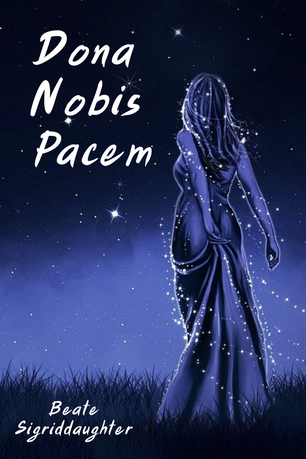 PORTLAND, OR; December 14, 2021— The stories in DONA NOBIS PACEM are longing for peace. All are told from a female point of view. The stories are divided into three sections: hostility out in the world, domestic difficulties, and a few new takes on fairy tales. Stories out in the world include reflections of a goddess observing a young man dying, Mary Magdalen mourning Jesus, an older German woman wanting to hide away from the world after World War II, and a young girl liking an outsider peace demonstrator while she is part of a right to life demonstration, among others. The domestic stories deal with neglect, child abuse, fear of being pregnant, and similar complications. The fairy tales all mourn a certain loss of magic in our world. About the Author Beate Sigriddaughter, www.sigriddaughter.net, was poet laureate of Silver City, New Mexico (Land of Enchantment) from 2017 to 2019. Her work has received several poetry awards. Červená Barva Press published her poetry chapbook Dancing in Santa Fe and other poems in 2019 and Unsolicited Press published her poetry chapbook Emily (February 2020). About Unsolicited Press Unsolicited Press was founded in 2012 and is based in Portland, OR. The press strives to produce exceptional works of fiction, nonfiction, and poetry from award-winning authors. Learn more at www.unsolicitedpress.com. Unsolicited Press is inviting you to a reading with S.B. Borgersen and Margaret DeRitter.
S.B. Borgersen is a British/Canadian author, of middle England and Hebridean ancestry, whose favoured genres are flash and micro fiction, and poetry. She had a diverse career path, an analyst in a shoe factory, the same thing for a children’s book publisher, teaching art, and filing for the civil service, but mostly she climbed a precarious ladder in the IT industry culminating in strategy and project management, which, by necessity in those days, included writing writing writing mountains of non-fiction — always allowing herself to be slightly creative with proposals, reports, technical and training documentation. Sue turned her back on industry and commerce in the early nineties, escaping the stressful rat-race and finding the simple life and peaceful place she’d always sought to allow for creativity. That place was Nova Scotia where she returned to her skills from art school and made an uncomplicated living as a visual artist and potter. That is, until she got the creative writing bug. Since 2000 her writing has won prizes, been mentioned in Hansard and published internationally in literary journals and anthologies (print and online). The list of publications is extensive and can be found at www.sueborgersen.com. She is a loyal member of The Writers’ Federation of Nova Scotia and an enthusiastic member of the international online writers' group for expats, Writers Abroad. Sue lives in a crumbling old house on the shores of Nova Scotia with her patient husband and a clutch of lovable rowdy dogs. She has two middle-aged children. ---- Margaret DeRitter is the poetry editor and copy editor of Encore, a regional magazine based in Kalamazoo, Michigan. She was a winner of the 2018 Celery City Chapbook Contest, sponsored by Kalamazoo’s Friends of Poetry, for her chapbook Fly Me to Heaven By Way of New Jersey. Her writing has appeared in the anthologies Surprised By Joy (Wising Up Press) and Queer Around the World (Qommunicate Publishing) and in a number of journals, including The 3288 Review, which nominated her poem “At the top of Sleeping Bear Dunes” for a Pushcart Prize. DeRitter has also written numerous magazine and newspaper articles. She worked for 22 years at the Kalamazoo Gazette and has taught journalism at Western Michigan University and Kalamazoo College. She was born and raised in New Jersey and has lived in Michigan since college. When not writing or editing, she often paddles Michigan lakes and rivers. Access the event on our Events Calendar. Unsolicited Press is inviting you to a reading with C.M. Chapman and Larry D. Thacker.
What scares you more? The monster under your bed or the one staring back at you in the mirror? Authors C.M. Chapman and Larry Thacker blur the lines between the kinds of monsters that roam the earth in their latest short story collection, EVERYDAY, MONSTERS. In twenty-one stories, readers encounter monsters ranging from mythological, psychological, maliciously human, and darkly comical. Monsters creep from the deepest parts of humanity, the kind that we are born with, proving that even those with the best senses can overlook shadowy lurking beasts. Chapman and Thacker execute with skill everyday storytelling that leaves readers in a sense of wonder and wondering if what they know is truth or make believe. C.M. Chapman’s work has appeared in numerous literary journals, including Cheat River Review, Limestone, Still: The Journal, Dark Mountain Project in the U.K., and the anthology, So It Goes: A Tribute to Kurt Vonnegut. He is the author of the chapbook, Music & Blood, from Latham House Press, and his novel-in-stories, Suicidal Gods, was published by Unsolicited Press in 2019. He is a graduate of the low-residency MFA program at West Virginia Wesleyan College, where he served as The McKinney Teaching Fellow for three years and as an adjunct professor. Larry D. Thacker’s stories can be found in past issues of The Still Journal, Fried Chicken and Coffee, Dime Show Review, Vandalia Journal, and Grotesque Quarterly. His stories have been twice nominated for the Pushcart and once for a Best of the Net recognition. His poetry can be found in over 170 publications, including Still: The Journal, The American Journal of Poetry, Poetry South, Tower Poetry Society, Spillway, The Southern Poetry Anthology, Town Creek Poetry, and Appalachian Heritage. His books are Mountain Mysteries: The Mystic Traditions of Appalachia, the short story collection, Working it Off in Labor County, and the poetry books, Feasts of Evasion, Grave Robber Confessional, Voice Hunting, Memory Train, and Drifting in Awe. His MFA in poetry and fiction is from West Virginia Wesleyan College. He serves as adjunct instructor at Northeast State Community College. Visit: www.larrydthacker.com To access the event, head over to our Events Calendar. Unsolicited Press is inviting you to a reading with Richard Krause and Daniel Coshnear.
SEPARATION ANXIETY by Daniel Coshnear is a stunning short story collection that shows how pervasive the disorder can be in everyday lives. In eighteen stories, Coshnear paints separation anxiety as an engine of change while being careful to tend to the delicateness of the disorder's consequences. Readers become intimately acquainted with the captain of a SWAT (team), a mental health case worker who falls deeply in love, an elderly man who is driven to rage when his wife is buried in the wrong hole, and many more. Crawl Space and Other Stories of Limited Maneuverability by Richard Krause addresses how the problems of space reveal disturbing aspects of human nature. It uncovers their realities in city apartments, college campuses, the basements of orphanages, under bridges in Mexico, through miracles in hospital rooms, inside a bullring, at urinals, in the closed world of a Biblical drama, in high chairs, inside the lives of a pearl family, and in the actual crawl space underneath a wood frame house. These are stories that their author had little choice but to write. Everyone is welcome to join. Access the event using our events calendar: https://www.unsolicitedpress.com/events.html Unsolicited Press is happy to host a reading with Rosalia Scalia and Taylor Garcia.
As your family is bright, so is it dark. Sure, the love and laughter of family lingers in your heart, yet it’s the secrets, pranks, and punishments that haunt your soul. The mothers, fathers, daughters, and sons in Functional Families all seek only love to cure their familial ills, but they often go about it in strange ways. To come to terms with his father’s past and encroaching dementia, Reynold Vasquez takes his father out for one last fancy dinner in “Bird Dog,” while in “Bat Out of Hell,” Margaret abandons her mother at a Tijuana gas station hoping to move on with her life. In “My First War,” young cadet Gilbert Fernandez goes AWOL from a pretend battlefield to be with his pregnant girlfriend on the verge of an abortion, and in “Wheel of Fortune,” Hillary Clinton visits a homegirl fortune teller in Santa Fe, New Mexico. In the end, these disparate souls resolve their desperate actions to return to their nuclei, the only places they can call home. In STUMBLING TOWARD GRACE, Rosalia Scalia explores how people who love each other struggle to reconnect their fractured relationships in the face of traumas, personal flaws, and unspoken hurts. Many of her stories explore loss and grief with humor and grace as characters navigate their unwise decisions, unexpected deaths, or their resentments polished into gems. Overall this collection offers readers stories about ordinary people striving to survive and thrive in situations reflective of today’s challenges. Join us on November 30th via Zoom. Access the free reading on our events calendar: https://www.unsolicitedpress.com/events.html Unsolicited Press is hosting a joint reading with Washington authors Jay Kristensen Jr. and Trevor J. Houser.
Trevor J. Houser lives with his family in Seattle. He has published stories in Zyzzyva, Story Quarterly and The Doctor TJ Eckleburg Review, among others. Three of his stories were nominated for the Pushcart Prize. Jay Kristensen Jr. was born and raised in Seattle. He has lived around the country and currently resides in Seattle. Light in Rosadero is his debut novel. Access the event using our events calendar: https://www.unsolicitedpress.com/events.html 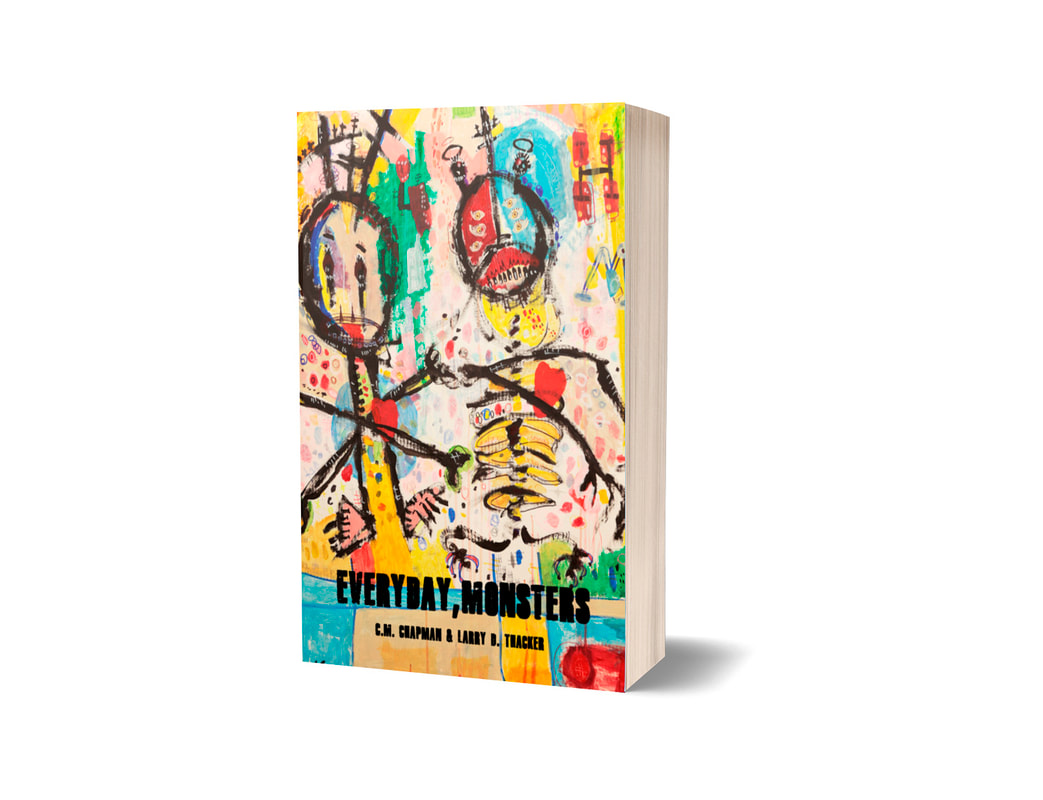 PORTLAND, OR; November 23, 2022— What scares you more? The monster under your bed or the one staring back at you in the mirror? Authors C.M. Chapman and Larry Thacker blur the lines between the kinds of monsters that roam the earth in their latest short story collection, EVERYDAY, MONSTERS. In twenty-one stories, readers encounter monsters ranging from mythological, psychological, maliciously human, and darkly comical. Monsters creep from the deepest parts of humanity, the kind that we are born with, proving that even those with the best senses can overlook shadowy lurking beasts. Chapman and Thacker execute with skill everyday storytelling that leaves readers in a sense of wonder and wondering if what they know is truth or make believe. About the Authors C.M. Chapman’s work has appeared in numerous literary journals, including Cheat River Review, Limestone, Still: The Journal, Dark Mountain Project in the U.K., and the anthology, So It Goes: A Tribute to Kurt Vonnegut. He is the author of the chapbook, Music & Blood, from Latham House Press, and his novel-in-stories, Suicidal Gods, was published by Unsolicited Press in 2019. He is a graduate of the low-residency MFA program at West Virginia Wesleyan College, where he served as The McKinney Teaching Fellow for three years and as an adjunct professor. Larry D. Thacker’s stories can be found in past issues of The Still Journal, Fried Chicken and Coffee, Dime Show Review, Vandalia Journal, and Grotesque Quarterly. His stories have been twice nominated for the Pushcart and once for a Best of the Net recognition. His poetry can be found in over 170 publications, including Still: The Journal, The American Journal of Poetry, Poetry South, Tower Poetry Society, Spillway, The Southern Poetry Anthology, Town Creek Poetry, and Appalachian Heritage. His books are Mountain Mysteries: The Mystic Traditions of Appalachia, the short story collection, Working it Off in Labor County, and the poetry books, Feasts of Evasion, Grave Robber Confessional, Voice Hunting, Memory Train, and Drifting in Awe. His MFA in poetry and fiction is from West Virginia Wesleyan College. He serves as adjunct instructor at Northeast State Community College. Visit: www.larrydthacker.com About Unsolicited Press Unsolicited Press was founded in 2012 and is based in Portland, OR. The press strives to produce exceptional works of fiction, nonfiction, and poetry from award-winning authors. Learn more at www.unsolicitedpress.com. EVERYDAY, MONSTERS is available on November 23, 2022 as a paperback (284 p.; 978-1-950730-88-9) and e-book (all major retailers). The title is distributed to the trade by Ingram. 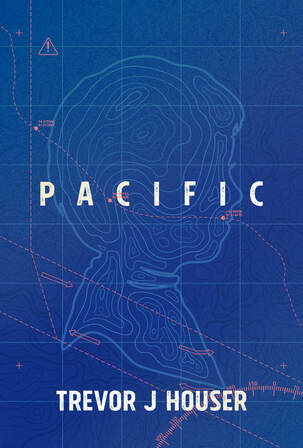 PORTLAND, OR; November 23, 2021-- Would you be willing to kidnap your child to save his life and set sail in search of a doctor that may hold the key to his survival when everyone else has given up? When it means you may lose everything regardless of the outcome? Pacific by Trevor J. Houser discovers what a desperate father is willing to do to save his son’s life...even if it means braving deadly storms at home and on the run. On a remote Puget Sound island, police chief Bell navigates his job and marriage in the wake of his son’s near-death brain surgery. When his wife no longer wants to tempt the fates of experimental medicine he takes matters into his own hands. With the help of his spaced-out fisherman friend, Bell kidnaps his boy and sets sail for Guatemala in search of the mysterious Dr. Haas. On the way, they’ll brave the seventh biggest storm, befriend two behemoth fly-fishing Nords, and try to outrun the ex-Navy captain hired by his wife to find them. Advance Praise for PACIFIC “Very heartfelt and amazing story, loved it.” – Gus Van Sant “If you are a father, or know one, Trevor Houser’s Pacific, is a wild, quixotic ride that will challenge your understanding of what it is to be a parent.” -Larry Colton, author of Southern League and Counting Coup “Poetic. Suspenseful. And at times darkly comic. Get ready for an adventure in heartbreak.” —Michael Mazza, author of That Crazy Perfect Someday About Trevor J. Houser Trevor J. Houser lives with his family in Seattle. He has published stories in Zyzzyva, Story Quarterly and The Doctor TJ Eckleburg Review, among others. Three of his stories were nominated for the Pushcart Prize. About Unsolicited Press Unsolicited Press was founded in 2012 and is based in Portland, OR. The press strives to produce exceptional works of fiction, nonfiction, and poetry from award-winning authors. Learn more at www.unsolicitedpress.com. PACIFIC is available on November 23, 2021 as a paperback (258 p.; 978-1-950730-84-1) and e-book (all major retailers). The title is distributed to the trade by Ingram. The author is open to speaking with the media, holding readings, and engaging in other author opportunities. ### Press only, Unsolicited Press Eric Rancino 619.354.8005 marketing@unsolicitedpress.com For artist interviews, readings, and podcasts: Trevor J. Houser trevorhouser11@gmail.com Poet Brook Bhagat's ONLY FLYING Celebrates Transformation and Rebellion with Striking Determination11/16/2021
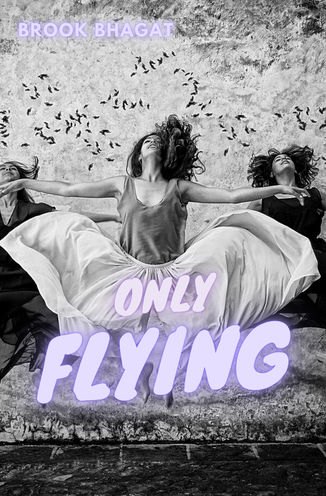 PORTLAND, OR; November 16, 2021— Unsolicited Press announces the release of Only Flying by Brook Bhagat. Only Flying is a collection of surreal free verse and prose poetry that celebrates transformation and paradox, exploring both the silence of the seeker and the outrageous wilderness of the imagination. Thematic threads like rebellion, enlightenment, risk, courage, love, loss, and triumph dance to life with pictures that swing from dark to light, surreal to whimsical, and strange to familiar. There are intimate goddesses here, black widows, buddhas, alley cats, a kangaroo, and magic pants—blacklight-blue Hendrix flares that hang from a fire escape, just waiting for the right person to jump up and steal them. That person is you. From the Collection ECLIPSE Night after night I climb out the same window, light a cigarette in the snow and look for home. About Brook Bhagat Brook Bhagat’s poetry, fiction, non-fiction, and humor have appeared in Monkeybicycle, Empty Mirror Magazine, Soundings East, Little India, Prometheus Dreaming, Anthem: A Tribute to Leonard Cohen, and other journals and anthologies. She is the 2020 winner of A Story in 100 Words’ nature writing contest and the 2021 winner of Loud Coffee Press’s summer microfiction contest. She and her husband Gaurav created Blue Planet Journal, which she edits and writes for. She holds an MFA from Lindenwood University, is an assistant professor of English at a community college, and is writing a novel. See more at brook-bhagat.com or reach her on Twitter at @BrookBhagat. Praise for ONLY FLYING In this intimate collection of interwoven poetry and prose, the magical and the mundane coexist in an exploration of personal transformation. Whether stealing magic pants off a stranger’s fire escape or unearthing new hands from the soil of a spring garden, Brook Bhagat creates a sensory experience threaded with longing and loss. At the same time, she effortlessly emphasizes the beauty of small things, echoes of ephemeral moments made up of salt and stars, feathers and eggshells. The poet turns inwards in her exploration, folds up like a paper tiger, only to then reemerge transcendent and renewed, unshackled from the gravity of false expectations and desires. In a dizzying dance of imagery and light, Bhagat’s lyricism creates a sense of remembering, a reckoning released on the wings of a wish. --Carina Bissett, award-winning writer and co-editor of Shadow Atlas: Dark Landscapes of the Americas. About Unsolicited Press Unsolicited Press was founded in 2012 and is based in Portland, OR. The press strives to produce exceptional works of fiction, nonfiction, and poetry from award-winning authors. Learn more at www.unsolicitedpress.com. ONLY FLYING is available on November 16, 2022 as a paperback (96 p.; 978-1-950730-83-4) and e-book (all major retailers). The title is distributed to the trade by Ingram. ### Press only, Unsolicited Press Eric Rancino 619.354.8005 marketing@unsolicitedpress.com For artist interviews, readings, and podcasts: Brook Bhagat https://brook-bhagat.com/contact/ We are excited to invite you to a reading with Heather Lang-Cassera and Bree Rolfe on November 21. 2021. It will be a virtual reading on Zoom at 6:30 PM Pacific time. You can access the event on our Events page.
Unsolicited Press is happy to host a reading featuring Brook Bhagat and Frances Badalamenti.
Only Flying by Brook Bhagat is a collection of surreal free verse and prose poetry that celebrates transformation and paradox, exploring both the silence of the seeker and the outrageous wilderness of the imagination. Thematic threads like rebellion, enlightenment, risk, courage, love, loss, and triumph dance to life with pictures that swing from dark to light, surreal to whimsical, and strange to familiar. There are intimate goddesses here, black widows, buddhas, alley cats, a kangaroo, and magic pants—blacklight-blue Hendrix flares that hang from a fire escape, just waiting for the right person to jump up and steal them. That person is you. Salad Days by Frances Badalmenti vacillates between youth-driven cultures of mid-nineties era Jersey and early aughts Portland. As the dual story unfolds, we witness the twenty-something protagonist, Ana, as she takes a crack at being an adult, navigating friendships and searching for intimate relationships, maintaining jobs and managing money. All the while, she does her best to repair a broken moral compass without an owner’s manual. The reading will feature both authors reading and if there is time at the end, a casual Q+A. You can join the event by clicking on the Zoom link listed on the events calendar: https://www.unsolicitedpress.com/events.html. 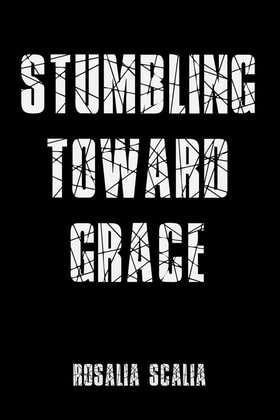 PORTLAND, OR; November 9, 2021— Within the fifteen short stories of STUMBLING TOWARD GRACE, Rosalia Scalia explores how people who love each other struggle to reconnect their fractured relationships in the face of traumas, personal flaws, and unspoken hurts. Many of her stories explore loss and grief with humor and grace as characters navigate their unwise decisions, unexpected deaths, or their resentments polished into gems. Overall this collection offers readers poignant moments about ordinary people striving to survive and thrive in situations reflective of today’s challenges. From the Book THERE WAS A fourteen-year-old Black boy. There was a twenty-one-year-old White woman. There was a whistle. There were two White men. There was a Crow named Jim. There was a kidnapping. There was a seventy-five-pound cotton gin fan. There was a lesson in colors, meaning that there were two White men who thought they’d teach the Black boy about a lesson in Money, Mississippi. There was a shed. There were cries in the shed over a lesson in colors, meaning the Black boy who whistles—who probably never ever kissed a girl, who called for his mama—learned a hard lesson in color. You just learned how to whistle to call your dog, Champ, but you don’t want to call Champ anymore because the Crow might come instead. Praise for Rosalia Scalia These stories are like a diamond, and Scalia's prose is a fine cut. Her debut sparkles with the energy of its characters -- all of them radiate their hopes, their tragedies, their humanity on the page. Reading this collection is like being given a close, multi-faceted look right into the heart of a city and its people." — Susan Muaddi Darraj Rosalia Scalia is Baltimore’s Flannery O’Connor. She inhabits her disparate characters, warts and all. Not an easy task considering the bigots, religious fanatics, hoarders, alcoholics, drug users, and damaged lives presented here. And yet, like the fictional Father Brown, she refrains from judgments, allowing each a generous shot at redemption. —Richard Peabody, editor/publisher, Gargoyle Magazine About Rosalia Scalia Rosalia Scalia’s fiction has appeared or is forthcoming in The Oklahoma Review, North Atlantic Review, Notre Dame Review, The Portland Review, and Quercus Review, among many others. She holds an MA in writing from Johns Hopkins University and is a Maryland State Arts Council Independent Artist's Award recipient. She won the Editor's Select award from Willow Review and her short story in Pebble Lake was nominated for a Pushcart Prize. She lives in Baltimore with her family. About Unsolicited Press Unsolicited Press was founded in 2012 and is based in Portland, OR. The press strives to produce exceptional works of fiction, nonfiction, and poetry from award-winning authors. Learn more at www.unsolicitedpress.com. STUMBLING TOWARD GRACE is available on November 9, 2021 as a paperback (254 p.; 978-1-950730-82-7) and e-book (all major retailers). The title is distributed to the trade by Ingram. The author is open to speaking opportunities, interviews with the media, and readings. Electronic review copies are available upon request. ### Press only, Unsolicited Press Eric Rancino 619.354.8005 marketing@unsolicitedpress.com For artist interviews, readings, and podcasts: Rosalia Scalia rscalia1@yahoo.com 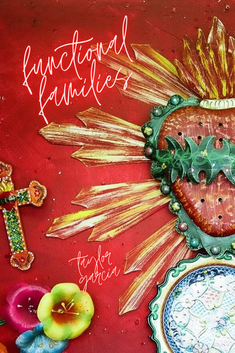 PORTLAND, OR; November 2, 2021--As your family is bright, so is it dark. Sure, the love and laughter of family lingers in your heart, yet it’s the secrets, pranks, and punishments that haunt your soul. The mothers, fathers, daughters, and sons in Functional Families all seek only love to cure their familial ills, but they often go about it in strange ways. To come to terms with his father’s past and encroaching dementia, Reynold Vasquez takes his father out for one last fancy dinner in “Bird Dog,” while in “Bat Out of Hell,” Margaret abandons her mother at a Tijuana gas station hoping to move on with her life. In “My First War,” young cadet Gilbert Fernandez goes AWOL from a pretend battlefield to be with his pregnant girlfriend on the verge of an abortion, and in “Wheel of Fortune,” Hillary Clinton visits a homegirl fortune teller in Santa Fe, New Mexico. In the end, these disparate souls resolve their desperate actions to return to their nuclei, the only places they can call home. Families. You can’t pick them, but you can keep them. Or not. About Taylor García Taylor García is the author of the novel Slip Soul, and several short stories and essays. He also writes the weekly column, “Father Time” at the Good Men Project, and holds an MFA from Pacific University Oregon. García is a multi-generational Neomexicano originally from Santa Fé, New Mexico now living in Southern California with his wife and children. About Unsolicited Press Unsolicited Press was founded in 2012 and is based in Portland, OR. The press strives to produce exceptional works of fiction, nonfiction, and poetry from award-winning authors. FUNCTIONAL FAMILIES is available on November 2, 2021 as a paperback (188 p.; 978-1-950730-87-2) and e-book (all major retailers). The title is distributed to the trade by Ingram. Trevor J. Houser lives with his family in Seattle. He has published stories in Zyzzyva, Story Quarterly and The Doctor TJ Eckleburg Review, among others. Three of his stories were nominated for the Pushcart Prize. His novel Pacific is about a father who is tested to the limits to save his son. Copies can be purchased HERE. But before you buy a copy, get to know Trevor through this quirky Q+A: If you could cook dinner for any author, dead or alive, who would it be? What would you make?
Henry Miller. Cassoulet. What scares you the most about the writing process? How do you combat your fears? Not having enough time. Who is your biggest literary crush, author or character? Lady Brett Ashley from THE SUN ALSO RISES. What books are on your nightstand? WHY DID I EVER, Mary Robison THE NAKED AND THE DEAD, Norman Mailer SPEEDBOAT, Renata Adler THE ART OF FICTION, John Gardner Favorite punctuation mark? Why? A question mark can feel surprising, sometimes even interactive. What book were you supposed to read in high school, but never did? I was supposed to read The Grapes of Wrath, but I remember we read it so slowly I think I just gave up and skimmed the back half. And I really like Steinbeck. What inanimate object would you thank in your acknowledgements? My pillow. I do my best writing with my head on it. If you could write an inspirational quote on the mirrors of aspiring writers, what would you write? You found something you love. Does writing energize or exhaust you? It’s both. I’m energized in the moment and exhausted when I think how far away the last page is. What are common traps for aspiring writers? Wanting too much to be like your heroes and thinking it will happen the same way it did for them. What is your writing Kryptonite? Time. Also movies. Have you ever gotten reader’s block? When I’m in the middle of writing something I find myself reading very little. I look at books for inspiration, but I don’t really enjoy them. They become little more than blueprints or maybe talismans. Do you think someone could be a writer if they don’t feel emotions strongly? I’m not sure. Camus and Tao Lin convey very little emotion and they are two of my favorites. Of course, that doesn’t mean they didn’t/don’t feel emotions strongly as they wrote/write. What other authors are you friends with, and how do they help you become a better writer? Out of college I worked at a Little, Brown where everyone wanted to be a great novelist or playwright. When people you know are working on something it makes you want to be working on something, too. Do you want each book to stand on its own, or are you trying to build a body of work with connections between each book? I’d like each book to stand on its own, but that’s not to say there aren’t connections I’m making subconsciously. How did publishing your first book change your process of writing? I’m not sure it changed my process although it probably made me write with less desperation. What was the best money you ever spent as a writer? Whatever a used paperback of On the Road cost. What authors did you dislike at first but grew into? I wanted to hate Dave Eggers after reading the title of his first book, but that didn’t last long. What was an early experience where you learned that language had power? Probably my dad giving a speech. All the references and word play. The topic wasn’t exactly exciting, but he elevated it through language. What’s your favorite under-appreciated novel? Paradise by Donald Barthelme As a writer, what would you choose as your mascot/avatar/spirit animal? What do you owe the real people upon whom you base your characters? How many unpublished and half-finished books do you have? A very sad number. What does literary success look like to you? I want readers, critics and especially other writers to think it is good work. What’s the best way to market your books? Great reviews seem like the best bet. What’s the most difficult thing about writing characters from the opposite sex? I can trust my instincts with male characters. With female characters I need to tap into something that is mostly outside of myself. What did you edit out of this book? I mostly edit as I go so rarely do I have to cut out huge chunks once I’m finished. If you didn’t write, what would you do for work? Winemaker 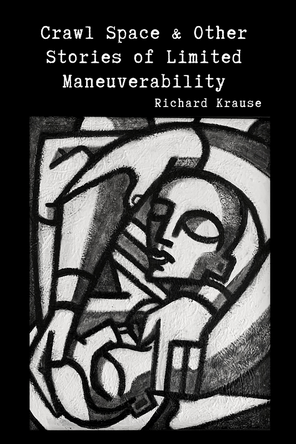 PORTLAND, OR; October 31, 2021-Crawl Space and Other Stories of Limited Maneuverability addresses how the problems of space reveal disturbing aspects of human nature. It uncovers their realities in city apartments, college campuses, the basements of orphanages, under bridges in Mexico, through miracles in hospital rooms, inside a bullring, at urinals, in the closed world of a Biblical drama, in high chairs, inside the lives of a pearl family, and in the actual crawl space underneath a wood frame house. These are stories that their author had little choice but to write. About Richard Krause RICHARD KRAUSE'S collection of fiction, Studies in Insignificance, was published by Livingston Press, and Unsolicited Press published his second collection, The Horror of the Ordinary. His epigram collection, Optical Biases, was published by EyeCorner Press in Denmark, and Propertius Press published his second collection, Eye Exams. Fomite Press will publish another collection of his epigrams, Blind Insights into the Writing Process, in January 2022. Krause grew up in the Bronx and on farms in Pennsylvania. He drove a taxi in NYC for five years and taught English for nine years in Japan. Currently, he is retired from teaching at a community college in Kentucky. About Unsolicited Press Unsolicited Press was founded in 2012 and is based in Portland, OR. The press strives to produce exceptional works of fiction, nonfiction, and poetry from award-winning authors. Crawl Space & Other Stories of Limited Maneuverability is available on October 31, 2021 as a paperback (310 p.; 978-1-950730-81-0) and e-book (all major retailers). The title is distributed to the trade by Ingram. 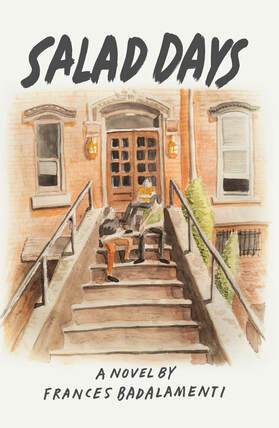 PORTLAND, OR; October 26, 2021--Salad Days vacillates between youth-driven cultures of mid-nineties era Jersey and early aughts Portland. As the dual story unfolds, we witness the twenty-something protagonist, Ana, as she takes a crack at being an adult, navigating friendships and searching for intimate relationships, maintaining jobs and managing money. All the while, she does her best to repair a broken moral compass without an owner’s manual. "Salad Days is the gritty, moving portrait of a young woman who completely upends her life trying to figure out who she is and what she wants, set against the gray, grungy background of Portland, Oregon, at a time when the city was also in flux. Badalamenti perfectly captures the alluring and maddening impenetrability of Portland for the East Coast transplant."--Cari Luna, Author of The Revolution of Every Day 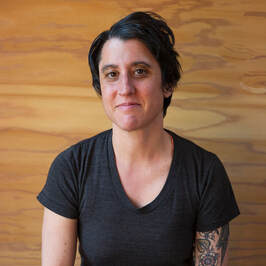 Frances Badalamenti was raised in Queens, New York and Suburban New Jersey, but she now lives in Portland, Oregon with her husband and son. Her essays, stories and interviews appear in The Believer Magazine, Longreads, Vol.1 Brooklyn, Entropy and elsewhere. Salad Days is her second novel. Interviews Growing the Courage, A Conversation with Frances Badalamenti, The Rumpus, 2019 An Interview with Frances Badalamenti, Author of I Don’t Blame You, Entropy, 2019 Praise For Previous Work "Frances Badalamenti proves to be a talented and evocative writer. I Don't Blame You is a powerful, heady, debut novel, gorgeously interweaving the story of grief, acceptance, and love. A must read." - Chloe Caldwell, author of I'll Tell You in Person and Women "I Don't Blame You is a raw, irreverent, wrenching exploration of the trauma and joy of being a daughter and a mother." - Michelle Tea, author of Black Wave, How to Grow Up and Modern Tarot BOOK DETAILS
ISBN: 978-1-950730-39-1 290 pages Fiction October 26, 2021 Paperback: $17.00 Distributor: Ingram Book Group MEDIA CONTACT INFORMATION Publicity Contact: Heather Brown Mind the Bird Media heather@mindthebirdmedia.com Brooklyn Bound Q She enters, takes a seat on the crowded bench opposite him, meets his gaze distractedly, and then peers into her handbag. He looks down and then across the car to the left and the right of her. He lets his eyes roam and return to settle upon her glossy paperback. Is he brave enough to read the title? Sure, he is. He’s interested in the book, in books, in what people are reading… Not in her. She adjusts her glasses, scans the car quickly for another open seat as if to say, I don’t want your attention. He averts his eyes as if to say: Don’t flatter yourself. Now, he’s interested in footwear. He smiles approvingly at the feet, of an old man in purple high-top sneakers as if to say, I have many interests. I value novelty, surprise, and risk. She is amused by her book, lets out a sigh and briefly smiles as if to say, I don’t even know you’re here. The train stops. Two men in suits depart and two teens, a girl and a boy with backpacks and hoodies and baggy black denims shuffle into the space between him and her and take hold of the overhead railings. The teens commence a conversation. “I read it,” the boy says. “All right. Who Nick?” “He the one that telling the story.” “Who Daisy then? “She the white chick that the other one is all hot for.” “All right. Who that other one and where he from?” He looks up. She looks up. She smiles briefly, as if to say, I remember the book. Or I remember high school. Or Doesn’t this seem ironic? These kids, in this time, speaking in those terms about that time. He smiles too as if to say, Isn’t the subway a magnificent experience? Or Isn’t it better when we don’t hide from one another? As if to say, you and I – we – are of the same background, the same class. We understand each other. The boy answers, “His name Jay. Just like my man, Jay Z.” “You don’t know shit,” the girl says. He grins. She grins. The train stops, and the teens depart. Her eyes revisit her book, dart back to him, and back again to the pages in front of her. He permits his smile to linger and allows his gaze to settle on her, in an unfocused way, as if to say, I’m at ease. I’m pleased. You’re safe. I’m interested. She brushes her bangs with the back of her wrist as if to say, I know you’re watching. As if to say, I’m not uncomfortable. As if to say, I don’t know what to say. She closes her paperback, and with unusual care, she puts it back into her handbag. She is saying that her stop is next. He bends to pull up his socks as if to say, I didn’t mean to embarrass you. Or Now you can look at me. Or This is my stop too. Maybe? She stands, turns to face the front of the train, turns her hips towards him, and pulls down the hem of her skirt. She looks down and up and back to the bench where she had been sitting. Then she finally risks a glance in his direction as if to say: Are you going to follow me, you creep? Or It’s now or never. Or simply Goodbye. He sets his hands on the bench beside him as if to steady himself for when the train slows down. Or perhaps to say, I’m getting up. Give me a sign, his face pleads. His eyes implore. Eight and a half million people here, and I won’t likely see you again. I’m not a creep, but… The train comes to a full stop. People exit; people enter. A crackling sound comes, and then a weary voice fills the car. “Next stop is Times Square. This is a Q train bound for Brooklyn. Change here for the N, R, S, 1, 2, 3, and 7 trains. Stand clear of the closing doors.” As if to say, Stand clear. The doors are closing. California Writer and Mental Health Counselor Pens a Book on the Engine of Anxiety in Everyday Life10/19/2021
PORTLAND, OR; October 19, 2021— SEPARATION ANXIETY is a stunning short story collection that shows how pervasive the disorder can be in everyday lives. In eighteen stories, Coshnear paints separation anxiety as an engine of change while being careful to tend to the delicateness of the disorder's consequences. Readers become intimately acquainted with the captain of a SWAT (team), a mental health case worker who falls deeply in love, an elderly man who is driven to rage when his wife is buried in the wrong hole, and many more.
From the Book At quarter to seven, he has one more hour of sunlight. He wanders the beach and the strip and returns to the beach. His skin, shrunken from the burn, shrinks more now in the cold. His lips look blue in an arcade mirror. The sky bleeds into twilight. There seems to be only one choice. He walks the long, flat, two-lane road back to the highway. He should’ve snatched a towel from the beach to keep warm, but he assures himself that it only takes one ride if you’re lucky, and he must be lucky, because the alternatives are too terrible. He imagines the perfect ride: Mrs. Hagner in her bra. Mrs. Hagner not in her bra. Her brown nipples pointing the way home. He doesn’t need to ponder on this long before he has an embarrassing lump in his shorts, and no one’s going to pick up a boy with an erection. Or maybe someone would, and that could be worse. He forces himself to imagine other perfect rides. Bruce Springsteen in a souped-up Charger with a double order of fries. He sings as he walks and surprises himself, because he knows all the words to “Born to Run” and most of “Thunder Road.” Praise for Daniel Coshnear’s Work “Daniel Coshnear’s stories are glimpses of peoples’ lives, thoughts, relationships…the facts of their lives. He manages to give a clear view of a character’s reality by looking just into ordinary incidents. His characters’ realities are multi-dimensional, and the characters themselves are complex. We perceive their thoughts, their needs and their circumstances through their eyes.” —Anastasia Tsolaki “As a physical object, the book is well-crafted. The stories are not just well-crafted (though they certainly are that) but illuminating and lyrical invocations of hopes and failures.” —Stephen O. Murray “The simplicity of the stories in Dan Coshnear's Occupy and Other Love Stories is deceptive. These are layered, complex stories, many of which examine the angst and the joy endemic to parenting. His narrators and protagonists are Everymen, each making his or her way the best they can through our crazy times. Life and parenting are often perplexing and Dan's careful storytelling and lovely prose, particularly phrases such as "sweet black sleep" make their challenges immediate and real.” —P. Porter “A well-balanced collection of short stories that will sit on my favorite shelf in a permanent position, I have no doubt. While reading, I had this feeling of honor - to be privy to such emotional openness and with such a deft hand.” —Stephanie Freele About Daniel Coshnear Daniel Coshnear lives in Guerneville, California with his wife and two children. He works at a group home for the homeless and mentally ill and teaches writing classes through UC Berkeley Extension. He is the author of Homesick, Redux (Flock 2015), Occupy & Other Love Stories (Kelly's Cove Press 2012) and Jobs & Other Preoccupations (Helicon Nine 2001) winner of the Willa Cather Fiction Award. About Unsolicited Press Unsolicited Press was founded in 2012 and is based in Portland, OR. The press strives to produce exceptional works of fiction, nonfiction, and poetry from award-winning authors. Learn more at www.unsolicitedpress.com. SEPARATION ANXIETY is available on October 19, 2021 as a paperback (244 p.; 978-1-950730-65-0) and e-book (all major retailers). The title is distributed to the trade by Ingram. The author is open to speaking opportunities, interviews with the media, and readings. Electronic review copies are available upon request. ### Press only, Unsolicited Press Eric Rancino 619.354.8005 marketing@unsolicitedpress.com For artist interviews, readings, and podcasts: Daniel Coshnear coshn@sonic.net 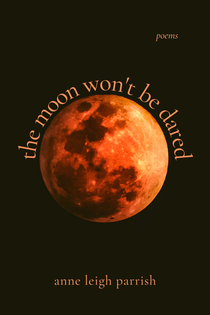 PORTLAND, OR; October 14, 2021— Unsolicited Press announces the release of the moon won’t be dared a poetry collection by award-winning author Anne Leigh Parrish that features artwork by Lydia Selk. In this momentous debut collection, the poet harnesses language to give readers a new vision of nature, the impossible plight of womanhood, love, aging, and beauty. Being a woman in a male-dominated society affords Anne Leigh Parrish the space to witness the world on an uneven keel. Parrish pays tribute to beauty, but also weaves the harsh truths of betrayal and brutality into the filaments holding the collection together. From the Book pulled back around circle or line? round or straight? what did einstein stay? the universe bends in on itself, or relates only to itself i don’t know but even a lizard remembers and is pulled back around and the memory held in my larger, more deeply folded brain cries to visit its hinterland, its former place as easily as the world circles from one day to the next Advance Praise for Anne Leigh Parrish Anne Leigh Parrish’s poems in the moon won’t be dared are an extended meditation that weaves through time and humanity, injustices and struggles, but with an eye towards love and beauty. These captivating poems carry an underlining ache of loss—past and future—but they are grounded in the present, in beetle and spider, in river and forest, in the windows that look into the yard. Parrish writes we can only burn slowly over time, and we see this book is full of light—fire, streetlight, smokelight, garden light, twilight, starlight, and in fact, darkness/becomes light when the world bears us/along. This is a voice willing to convey what isn’t working in the world, but also to always acknowledge what is—a child of the night/who lived on moonlight and cold sparkle stars. Parrish’s poems feed us, and they will hold us long enough/to tinge the dawn with hope. --Kelli Russell Agodon, author of Dialogues with Rising Tides (Copper Canyon Press). About Anne Leigh Parrish Anne Leigh Parrish is the author of nine previously published books: A Winter Night (Unsolicited Press 2021); What Nell Dreams, a novella & stories (Unsolicited Press, 2020); Maggie’s Ruse, a novel, (Unsolicited Press, 2017); The Amendment, a novel (Unsolicited Press, 2017); Women Within, a novel (Black Rose Writing, 2017); By the Wayside, stories (Unsolicited Press, 2017); What Is Found, What Is Lost, a novel (She Writes Press, 2014); Our Love Could Light The World, stories (She Writes Press, 2013); and All The Roads That Lead From Home, stories (Press 53, 2011). About Lydia Selk Lydia Selk is an artist who resides in the pacific northwest with her sweet husband. She has been creating analog collages for several years. Lydia can often be found in her studio with scalpel in hand, cat sleeping on her lap, and a layer of paper confetti at her feet. you can see more of her work on instagram.com/lydiafairymakesart. About Unsolicited Press Unsolicited Press was founded in 2012 and is based in Portland, OR. The press strives to produce exceptional works of fiction, nonfiction, and poetry from award-winning authors. Learn more at www.unsolicitedpress.com. THE MOON WON'T BE DARED is available on October 14, 2021 as a paperback (150 p.; 978-1-950730-80-3) and e-book (all major retailers). The title is distributed to the trade by Ingram. ### Press only, Unsolicited Press Eric Rancino 619.354.8005 marketing@unsolicitedpress.com For artist interviews, readings, and podcasts: Anne Leigh Parrish anneleighparrish@comcast.net |
Popular Topics
All
We Support Indie Bookshops |
Unsolicited Press
619.354.8005
info@unsolicitedpress.com
Portland, Oregon
619.354.8005
info@unsolicitedpress.com
Portland, Oregon
